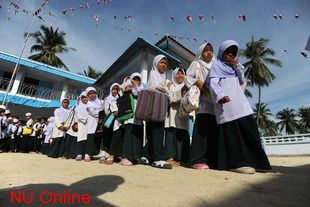Pattani, NU Online
A high-pitched chorus pours from a Muslim nursery school in the Deep South as girls in crisp white hijabs read aloud the curls and flourishes of a home-grown script virtually erased from public life. <>
Jawi, which uses the Arabic alphabet to write the Patani Malay language , is used by elders and taught to youngsters at private Muslim schools in Pattani, Yala and Narathiwat provinces.
The language is not on the curriculum in state schools. Village names once written in Jawi have been changed to Thai.
Some locals are keen to revive the writing and the cultural lineage it represents.
"We have to preserve our cultural uniqueness," local historian Ismail Ishaq Benjasmith said after Jawi classes at a tadika (religious school) in Saiburi district, Pattani.
It's a small issue, but it feeds into violence, he says, by crystallising support for the rebellion that has raged in the region for over a decade.
Jawi sign project stalled
Ismail leads a campaign to bring Jawi names back onto village signposts. Along with the Centre for Conservation for Local Culture and Environment in Southern Border Provinces of Thailand (PUSTA), he lobbied for ten villages to get a Jawi sign alongside the typical Romanised Rumi script for Malay.
Former Southern Border Provinces Administration Centre (SBPAC) Director Tawee Sodsong endorsed the pilot scheme, but the goal of all 2,000 Deep South villages receiving their Jawi name was put on hold when he was removed from his post in May, after Thailand's coup.
The script functions as a bridge to Arabic for the Muslim population. But now only the old or the very young have a grasp of the script that provides a link to the Qur'an, Ismail says.
"If you have something of your own and then someone takes it, it's natural to want to take it back," says Abdullah Bin Abdulrahman, a local businessman involved in the renaming project.
In mid-October, broadcasters began adding Jawi subtitles to Prime Minister Prayuth Chan-ocha's weekly televised address. In seven southern provinces, it is normally delivered in Thai with English subtitles.
On October 25th, the Deep South marked the 10th anniversary of the deaths of 85 anti-government protesters at Tak Bai . Most suffocated as they were carted off in military trucks.
For their part, rebels conduct near-daily ambushes or bomb attacks on security forces and terrorise civilians -- both Buddhist and Muslim -- with assassinations and arson attacks .
Teachers have been a particular target, with scores shot dead by insurgents who see them as agents of the Thai state.
Locals like Abdullah are desperate for a resolution to the region's bloody conflict.
"We are ready for a change, ready for peace ... but after so long I don't know if we will get it," he said.
Editing by Sudarto Murtaufiq
Terkait
Terpopuler
1
Khutbah Jumat: Ramadhan dan Kesempatan yang Tidak Selalu Terulang
2
Keluar Mani yang Tidak dan Membatalkan Puasa
3
Khutbah Jumat: Ramadhan, Melatih Sabar, Memperkuat Syukur
4
Khutbah Jumat: Tiga Kebahagiaan Orang Puasa
5
Kultum Ramadhan: Keutamaan Tarawih dan Witir
6
Khutbah Jumat: 4 Cara Menghidupkan Malam Ramadhan dengan Ibadah
Terkini
Lihat Semua



